

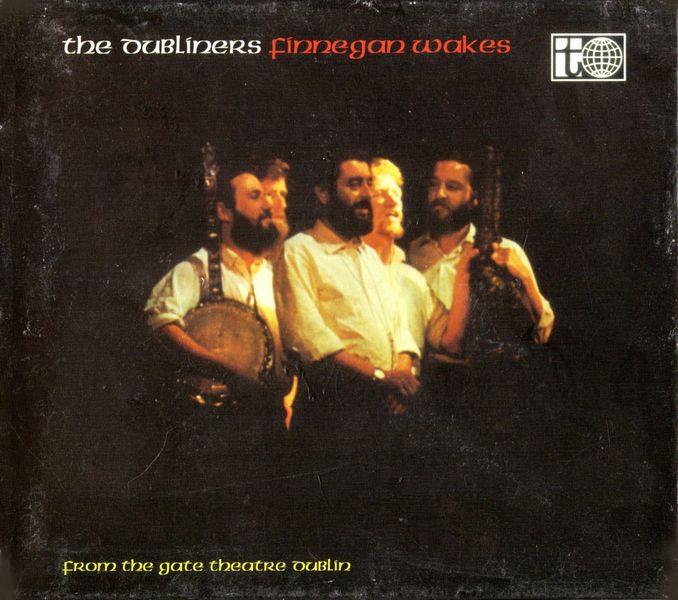
|
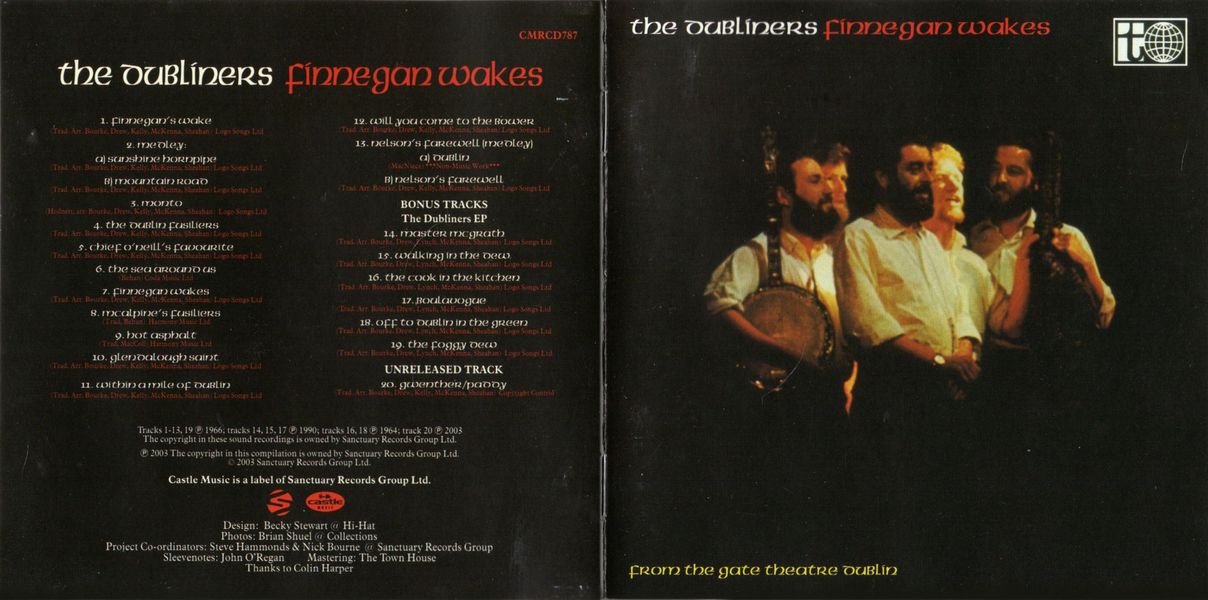
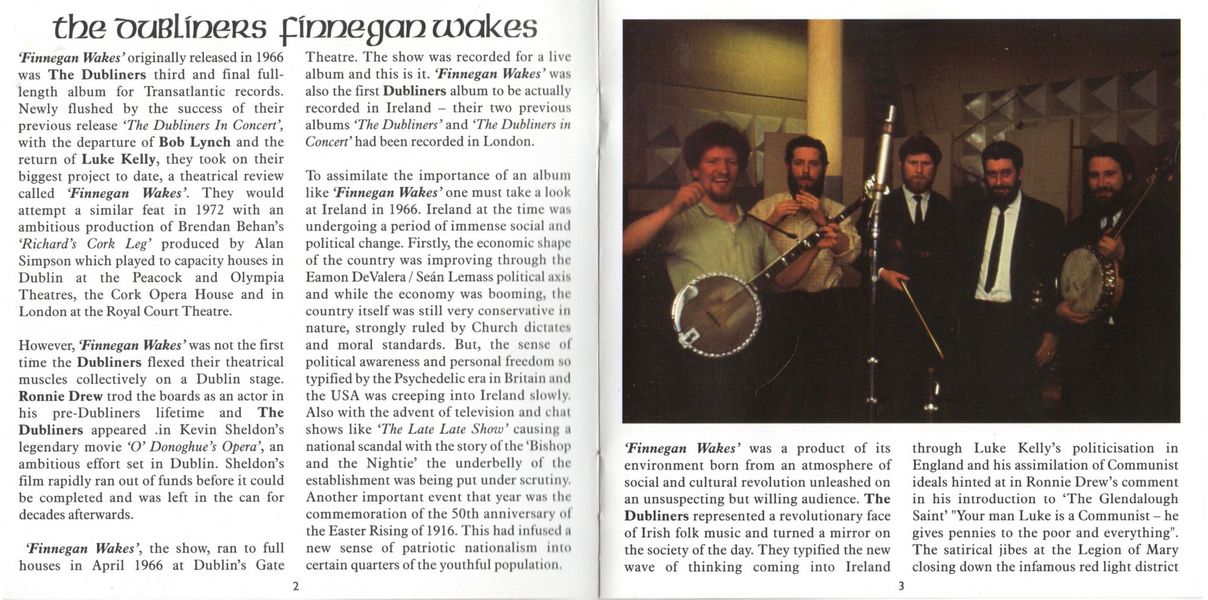 |
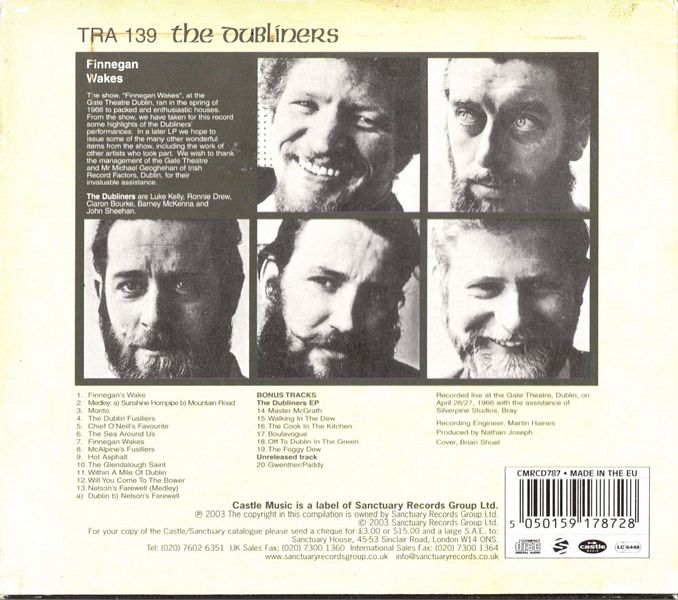
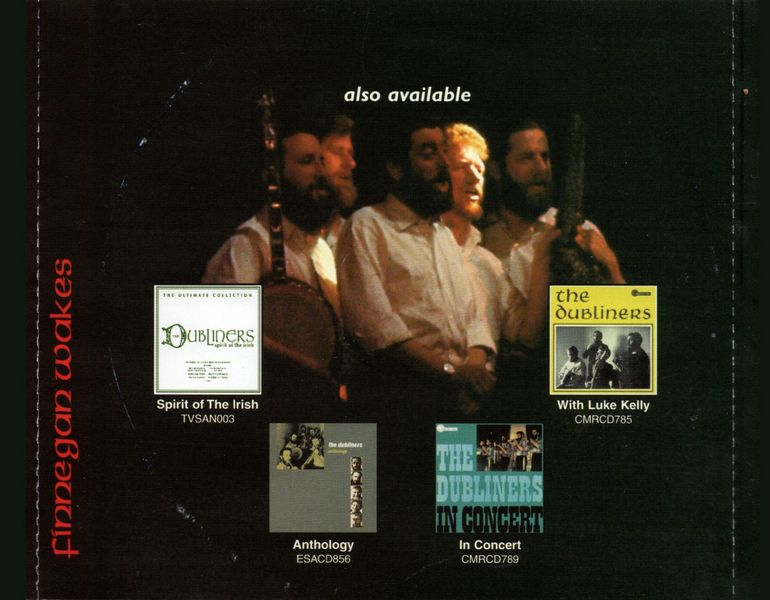
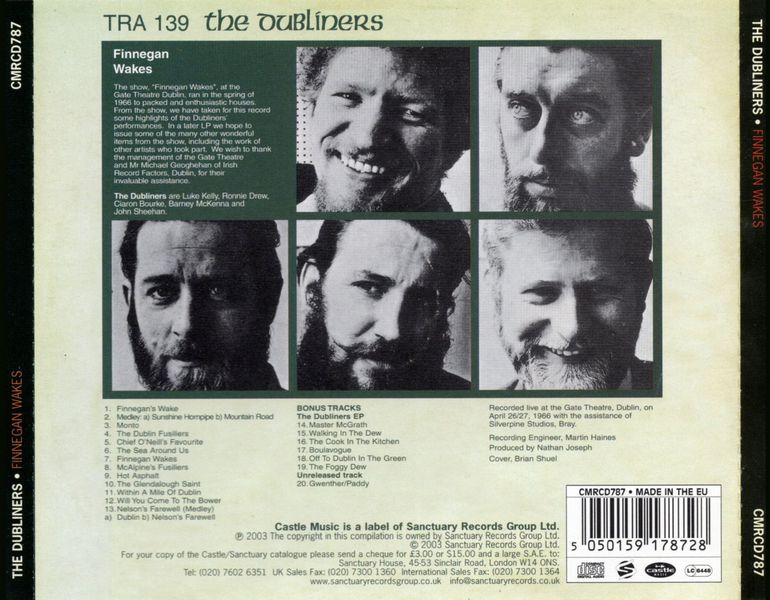
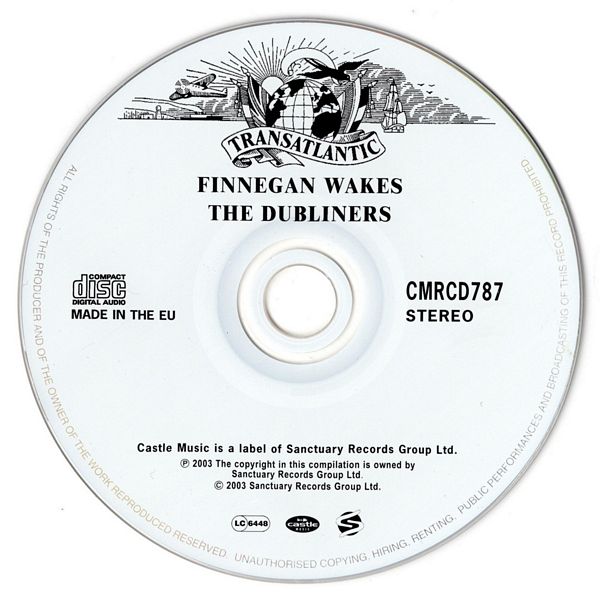
|
| more images |
Sleeve Notes
The show, "Finnegan Wakes", at the Gate Theatre Dublin, ran in the spring of 1966 to packed and enthusiastic houses. From the show, we have taken for this record some highlights of the Dubliners' performances. In a later LP we hope to issue some of the many other wonderful items from the show, including the work of other artists who took part. We wish to thank the management of the Gate Theatre and Mr. Michael Geoghehan of Irish Record Factors, Dublin, for their invaluable assistance.
The Dubliners are Luke Kelly, Ronnie Drew, Ciaron Bourke, Barney McKenna and John Sheahan
'Finnegan Wakes' originally released in 1966 was The Dubliners third and final full-length album for Transatlantic records. Newly flushed by the success of their previous release 'The Dubliners In Concert', with the departure of Bob Lynch and the return of Luke Kelly, they took on their biggest project to date, a theatrical review called 'Finnegan Wakes'. They would attempt a similar feat in 1972 with an ambitious production of Brendan Behan's 'Richard's Cork Leg' produced by Alan Simpson which played to capacity houses in Dublin at the Peacock and Olympia Theatres, the Cork Opera House and in London at the Royal Court Theatre.
However, 'Finnegan Wakes' was not the first time the Dubliners flexed their theatrical muscles collectively on a Dublin stage. Ronnie Drew trod the boards as an actor in his pre-Dubliners lifetime and The Dubliners appeared in Kevin Sheldon's legendary movie 'O' Donoghue's Opera', an ambitious effort set in Dublin. Sheldon's film rapidly ran out of funds before it could be completed and was left in the can for decades afterwards.
'Finnegan Wakes', the show, ran to full houses in April 1966 at Dublin's Gate Theatre. The show was recorded for a live album and this is it. 'Finnegan Wakes' was also the first Dubliners album to be actually recorded in Ireland — their two previous albums 'The Dubliners' and 'The Dubliners in Concert' had been recorded in London.
To assimilate the importance of an album like 'Finnegan Wakes' one must take a look at Ireland in 1966. Ireland at the time was undergoing a period of immense social and political change. Firstly, the economic shape of the country was improving through the Eamon DeValera / Seán Lemass political axis and while the economy was booming, the country itself was still very conservative in nature, strongly ruled by Church dictates and moral standards. But, the sense of political awareness and personal freedom so typified by the Psychedelic era in Britain and the USA was creeping into Ireland slowly. Also with the advent of television and chat shows like 'The Late Late Show' causing a national scandal with the story of the 'Bishop and the Nightie" the underbelly of the establishment was being put under scrutiny. Another important event that year was the commemoration of the 50th anniversary of the Easter Rising of 1916. This had infused a new sense of patriotic nationalism into certain quarters of the youthful population.
'Finnegan Wakes' was a 'product of its environment born from an atmosphere of social and cultural revolution unleashed on an unsuspecting but willing audience. The Dubliners represented a revolutionary face of Irish folk music and turned a mirror on the society of the day. They typified the new wave of thinking coming into Ireland through Luke Kelly's politicisation in England and his assimilation of Communist ideals hinted at in Ronnie Drew's comment in his introduction to 'The Glendalough Saint' "Your man Luke is a Communist — he gives pennies to the poor and everything". The satirical jibes at the Legion of Mary closing down the infamous red light district of 'Monto', and Ronnie Drew's comment, pertaining to the notion expressed then, that all books banned in Ireland be printed in Irish — "thus helping the Irish people to learn their own language" all made for one crackling powder keg of an album. In terms of social comment, this was The Dubliners at their most outspoken and anti-establishment. Even the more conservative elements of their following were challenged by their unmasking of the vagaries of the day's accepted norms. Along with Brendan Behan, The Dubliners eschewed the 'Mother Mo Chroi' vision of Ireland and were ready to make their opinions heard and 'Finnegan Wakes' was their witch burning. If there were any sacred cows to be attacked, The Dubliners were ready to hit them-head on.
The Irish audiences loved The Dubliners raw aggressive approach to folk music — "Irish Music with guts" as Tony Wilson an English journalist then based in Dublin described their musical style. 'Finnegan Wakes' was also a musical tour de force. The extra instrumental range and sophistication brought to the group by John Sheahan added considerably to their overall style and presentation. Luke Kelly's return brought an added vocal authority and would copper fasten his importance within The Dubliners story. Here they swung and swayed with greater power and exhilaration than before, Barney McKenna's banjo and mandolin, John Sheahan's fiddle, tin whistle and mandolin and Ciarán Bourke's tin whistle and harmonica provided a powerful musical back line for Luke Kelly and Ronnie Drew's charismatic voices. Barney's banjo playing cuts loose on 'Within a Mile of Dublin'. Sheahan's fiddle solo on 'The Sunshine Hornpipe'/ 'The Mountain Road' stands out, as does his mandolin duet with Barney McKenna on 'Chief O' Neill's Favourite' named after a Chicago police chief whose collections of Irish tunes have reached biblical status with musicians.
Vocally the choice was equally solid — the title track delivered in ironic fashion by Ronnie Drew echoes similarly inclined Irish vaudeville songs like 'The Night Pat Murphy Died'. Dominic Behan's 'McAlpines Fusiliers' and 'Hot Asphalt' capture the hard working lives of Irish navvies on English building sites. 'The Glendalough Saint' hits at religious celibacy while 'Monto' named after Montgomery Street, a famous red light district in Dublin, became theatricality in itself complete with references to the Queen and the Duke of Gloucester. 'The Sea Around Us' is another of Dominic Behan's outspoken assertions of National pride. The song was a No. l hit in 1966 for The Ludlows, a trio comprised of Seán Loughran, Margaret O'Brien and Jim McCann. McCann himself, after pursuing a successful solo career, joined The Dubliners in 1974, replacing Ronnie Drew. 'The Dublin Fusiliers' is a comic song associated with Dublin Vaudeville comedian Jimmy O'Dea, himself once a monumental figure in Irish entertainment. O'Dea is most remembered for his comic creations Biddy Mulligan the archetype Dublin street fishmonger and his role in the Hollywood movie of 'Darby O'Gill and the Little People'.
Social events of the day were commemorated in satirical songs like 'Nelson's Farewell' composed by Joe Dolan an original member of Sweeney's Men. 'Nelson's Farewell' salutes the fateful ending on March 8th 1966 of Admiral Nelson's reign over Dublin's City center. 'Nelsons Pillar' or 'The Pillar' had become a social meeting place as well as a reminder of colonial occupation. 'Nelson's Farewell' is preceded by Luke Kelly reciting a verse of Louis McNeice's poem 'Dublin', the words of which are penned with affection, the last line of which seemed strangely prophetic in the light of Admiral Nelson's sudden departure.
'Grey brick upon brick
Declamatory bronze on sombre pedestals
O'Connell, Grattan, Moore
And brewery tugs and swans
On the balustraded streams
And the bare bones of a fanlight
Over a hungry door
And the soft wind on the cheek
And porter from the taps
With heads of yellow cream
And Nelson on his pillar
Watching his world collapse'
'Finnegan Wakes' has the Dubliners at their most vigorous, brash and outspoken and essential — a description best summed up in Phil Lynnott's words "Live and Dangerous". This was the perfect curtain closer on their period with Transatlantic records as shortly afterwards, The Dubliners signed a new contract with Philip Solomon's Major Minor records. Pop chart stardom with 'Seven Drunken Nights', an adaptation of the Childe ballad 'Our Good Man' and learned from Connemara Sean-nós singer Joe Heaney which would be banned in Ireland for its controversial content was just a mere twelve months away.
Listening to 'Finnegan Wakes' some 37 years later, one cannot help but be caught up in The Dubliners vibrant energy and barely controlled enthusiasm. Here, The Dubliners were on home ground and were at their most raucous and ribald, most outspoken and controversial.
Adding bonus tracks to 'Finnegan Wakes', one finds while looking through the vaults the odd neglected 'missing piece' emerging in the shape of 'Guenther/Paddy' a classic slice of Ronnie Drew repartee. Also, looking at tracks taken from singles and EPs released by Transatlantic Records in 1966, there are four tracks from the EP 'More of The Dubliners', two songs 'Master McGrath' and 'Walking in the Dew' featuring Ronnie Drew and two instrumentals 'The Cook in the Kitchen' and 'Boulavogue'. 'The Cook in the Kitchen', a 6/8 time double jig tune is unique as it marks the first time The Dubliners added a guest musician, Dublin born uilleann piper Tommy Reck (RIP), to join Barney McKenna in a duel on uilleann pipes and tenor banjo. 'Boulavogue' remembers an incident in Wexford during the time of the 1798 rebellion and is rendered as a banjo solo. We also chose 'Off to Dublin in the Green' and 'The Foggy Dew' as two further bonus tracks from this period. These two tracks round up the selection of tracks recorded by The Dubliners that were not included on any of their albums but featured only on EPs and 45's. These tracks add further proof of The Dubliners musical virtuosity and complete, their discography with Transatlantic Records.
© John O'Regan July 2003 wifh grateful thanks to John Sheahan and Harriet Roche